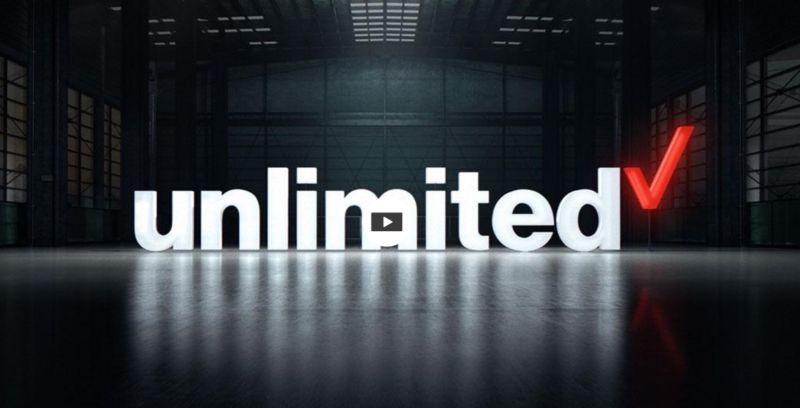
Verizon Wireless is once again selling an unlimited smartphone data plan. Verizon had stopped offering unlimited data to new customers in 2011 but has been facing pressure from T-Mobile USA's new unlimited offering.
Verizon initially responded to the competition by pointing out that (unlike T-Mobile) it doesn't impose limits on video quality and arguing that customers are better off using the nation's best network even if they don't have an unlimited data plan. But today, Verizon has started selling an unlimited plan that costs $80 a month for a single smartphone, $140 for two lines, $162 for three lines, and $180 for four lines. (These prices include the monthly "line access" charges, but not taxes and other fees.)
While T-Mobile's $70 unlimited plan limits streaming video quality to 480p, Verizon told Ars that "We deliver whatever the content provider gives us. We don’t manipulate the data." In practice, 480p looks pretty good on a smartphone screen, but it's an advantage for Verizon among customers who don't want any video quality limitations.
(UPDATE: T-Mobile has responded to Verizon's move by adding HD video and 10GB of high-speed hotspot data to its $70 unlimited plan, beginning Friday.)
Smartphone plans are never truly "unlimited," so let's break down what's being offered. The Verizon unlimited plan has no data cap and overage fees, so you can use your smartphone's Internet connection as much as you want without paying more. There is a chance your speeds will be throttled after you pass 22GB per month if you happen to be connecting to a congested cell tower, although Verizon said, "we don’t expect to do that very often." (T-Mobile imposes a similar restriction at 28GB per month.) Verizon's 22GB limit is applied separately to each line, so a four-phone plan would have 22GB each before throttling becomes a possibility.
The data is also only "unlimited" on the phone itself, but customers are allowed a limited amount of mobile hotspot use. Each phone can provide up to 10GB of 4G LTE tethering data to other devices each month. After that, tethering speeds are throttled to about 600kbps. Verizon is not providing any way to purchase extra high-speed tethering data on this plan.
Before today, Verizon's website prominently featured plans of up to 100GB (for a whopping $450) that let customers use the data either on their phones or in tethering mode. Today, the only limited plans on the main page are 2GB, 4GB, and 8GB. A Verizon spokesperson told us the plans are no longer available online but that customers can purchase them over the phone or in stores. This is apparently the only way to get more than 10GB of high-speed hotspot data a month without paying a lot of overage fees. Speeds on limited plans are reduced after customers hit their data caps unless customers buy more high-speed data at a rate of $15 for each gigabyte.
On T-Mobile, the $70-per-month unlimited plan throttles video and doesn't include any high-speed tethering, with mobile hotspot speeds capped at 512kbps. For $85 a month, T-Mobile's unlimited plan includes high-definition video, and for $95 a month the plan includes both HD video and unlimited 4G LTE hotspot speeds. (Those prices include taxes and fees.)
Sprint is offering a $50-per-month unlimited data plan, but it "optimizes" video, gaming, and music so that quality is reduced to use less data. AT&T's unlimited smartphone data plan is only available to customers who also subscribe to DirecTV or U-verse TV at home.
While Verizon remains the biggest US carrier, its wireless revenue declined in 2016, and its customer base grew at a slower rate than the previous year. T-Mobile's latest earnings report said that revenue is up and that the carrier was the "industry leader in net [postpaid] adds for the 11th consecutive quarter." T-Mobile has also been performing better in network speed and reliability tests, a crucial area where Verizon has long held a technological advantage.
reader comments
123